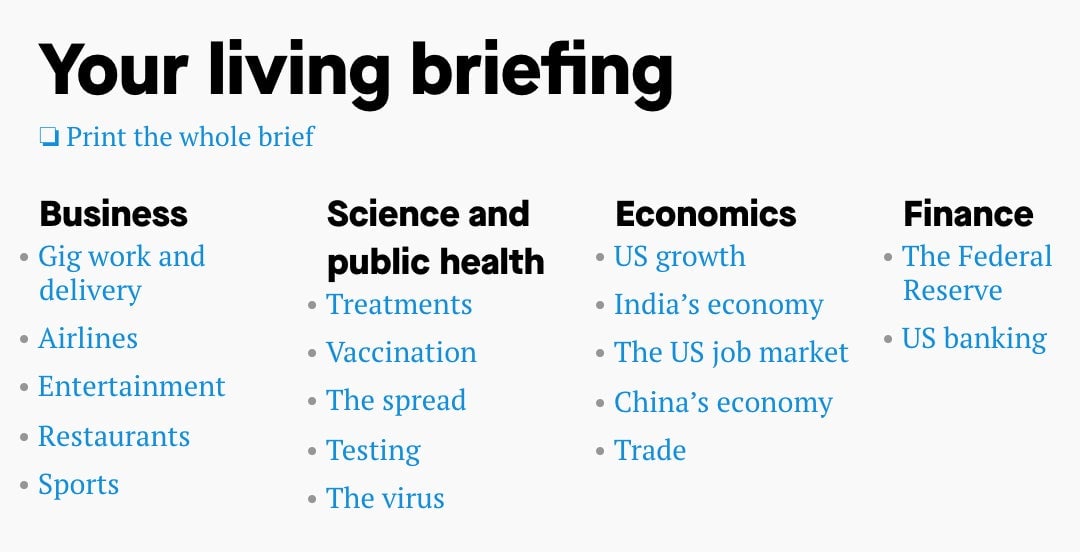For Quartz members—a new coronavirus briefing, cities, and moving
Dear members—

Dear members—
So much news is breaking about Covid-19 every day that it’s hard to see what it all adds up to. And, if you take a break for even one day, it’s hard to know what you missed. That’s why today we launched Quartz’s Coronavirus Living Briefing—everything you need to know about the economic impacts of the pandemic, ready when you are and all in one handy spot.
The briefing, which is available exclusively to Quartz members, is your one-stop-shop for understanding the effects of the pandemic, especially on the economy. And it keeps track of what’s new for you: Updates since your last visit are highlighted in a different color so you can quickly get up to speed on the latest news. The current table of contents gives you a sense of what our briefing includes:

Check it out and let us know what you think. We’re eager to hear your feedback: [email protected].
THE FUTURE OF CITIES
Last week, I asked how you thought cities would change, and how you hoped they would. Here’s some of what you said:
I hope that cities will invest more heavily in bicycle, e-bike, and open-air trolley services. Smaller cities should go all in on internet infrastructure and affordable housing. Take advantage of your smaller size by attracting people looking to work from home yet still have access to museums, culture, and infrastructure. The last thing is the internet. This plague has taught us that internet access is a right and a public need for school, sanity, information, and medical assistance. Make it part of a city’s infrastructure and a public utility. -Susan
I think use of public transport will dramatically change, with the dual impact of mass transit companies installing social distancing measures coupled with commuters’ unwillingness to travel in crowded carriages leading to a massive under utilisation of these systems. This in turn will increase travel costs and/or the subsidies these require to at least break even; will drive the permanent acceptance of WFH; and will force companies to revise working hours to allow people to work in teams (either in an office or from home) over part of a longer working day e.g. 6-7 hrs within a window from 5am hrs to 10pm. -Mike
I am very concerned about how necessary habits and attitudes we are being forced to quickly learn now under the pandemic shutdown (avoiding public places and shying away from being with other people, especially strangers) are the opposite of the habits and attitudes that citizens of vital, vigorous, welcoming, and successful cities have. I fear we will return to civic life with these wrong habits and attitudes that will have crippled our connections to our cities and to each other. Neither our civic life nor our cities’ economic lives can thrive under those conditions. -Connie
Here’s what I’d like to hear from you this week:
SMALL BUSINESSES
If you run a small business in the US with fewer than 100 employees, there’s still time to enter for a chance to receive free advertising exposure in Quartz’s Daily Brief newsletter (a $10,000 one-time value). Submit a brief statement about your business, starting with the products and services you offer, your challenges in the current market, and how exposure on Quartz could help you.
Best wishes for a safe and restorative weekend,
Walter Frick